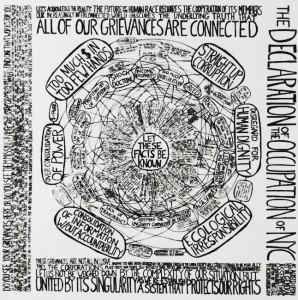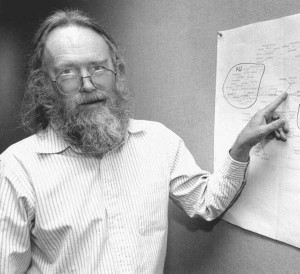A call for online civility, particularly on Twitter, was recently issued by Kathleen Fitzpatrick, Director of Scholarly Publishing at the Modern Language Association, in her blog post “If You Can’t Say Anything Nice“:
Folks, we need to have a conversation. About Twitter. And generosity. And public shaming…How can we develop modes of public critique that are rigorous and yet respectful?
I appreciate what Fitzpatrick is saying, and agree it would be good for people to generally have more generosity and consideration in communicating. Also, Fitzpatrick, whom I’ve had the pleasure to meet and discuss scholarly-communications issues with, is I’d say rather exemplary for generous, open, and forward-thinking discourse.
(also, disclosure, she has joined the Academic Steering and Advocacy Committee for the Open Library of Humanities, of which I am a co-founder. This actually happened while I was writing this post, that was pretty cool. Thanks Kathleen! Check’s in the mail).
On the other hand — to venture a bit of public critique that I hope is respectful — I believe there are significant dangers in asking others to behave as one would like, or as one believes oneself to be behaving, or trying to draw a line between, say, as Fitzpatrick does, “thoughtful public critique and thoughtless public shaming.”
The problem with asking us to behave the right way towards each other — the golden rule of reciprocity — is that, to paraphrase Kant, from the crooked timber of humanity, no symmetric thing was ever made.
To start, who are we calling “we”? There’s a history of dominant-group practices being asserted as natural “manners,” “civility” or such concepts. While people commonly say things like “basic civility” or “well-mannered,” historians and anthropologists such as Edward T. Hall tell us that interaction behaviors vary greatly across and within times and cultures, and can change fairly rapidly — for example, the mid-19th C. erosion of obligation to speak when addressed by a stranger on a city street, as examined by Richard Sennett in The Fall of Public Man. We can see today that attitudes, for example, on appropriate mobile-phone use, texting, or multitasking vary wildly around the world and between Americans.
 In my own work recently, looking at various online knowledge communities, it sometimes seems that different fields communicate so differently as to be almost mutually incomprehensible. For example, the savvy/snarky Silicon Valley engineering banter of Y Combinator’s Hacker News, vs. the genteel belles-lettristic London Review of Books, vs. the roving criticality of the The Disorder of Things. What is a deft critical sally or pertinent reminder in one place might easily be blunderbussing, precious, or preposterous in another.
In my own work recently, looking at various online knowledge communities, it sometimes seems that different fields communicate so differently as to be almost mutually incomprehensible. For example, the savvy/snarky Silicon Valley engineering banter of Y Combinator’s Hacker News, vs. the genteel belles-lettristic London Review of Books, vs. the roving criticality of the The Disorder of Things. What is a deft critical sally or pertinent reminder in one place might easily be blunderbussing, precious, or preposterous in another.
Secondly, an insistence on manners can often be a way to evade the discomfiture of having one’s thinking or practices challenged. This point was highlighted in a recent talk by legal scholar and civic activist Lawrence Lessig at Stanford, in which he argued that the political reform critically needed in the U.S. actually requires us to challenge and “make uncomfortable” our often like-minded acquaintances, to break the local convergence of opinion that creates crippling national polarization.
To solve Insider/Outsider + polarization: "I am willing to make my friends (fellow believers) uncomfortable" @LarryLessig #mediax2013
— Russell Thomas (@MrMeritology) January 9, 2013
Applying this line of thinking to the scholarly context discussed by Fitzpatrick, I would suggest that academic collegiality might be defined as the ability to have the widest possible disagreements — therefore, demanding from others the fewest rules and least concordance possible. To be other-engaged, and world-engaged, we need to be always leaning in to the uncomfortable. After all, the world is mostly other people who aren’t like you.
Consider this just from a practical standpoint for a moment. We live usually in cities, environments of complexity hardly conceivable 200 years ago; our lives are constantly woven together from a plenitude of networks and contexts. The more fleeting and dissociated and variegated our interactions — in the global Baudelairean “City of Modern Life” or the global glorious noise of Twitter — the more opportunities for civil symmetry to fail due to cultural difference, context collision, noise, or accident. Smooth functioning with diverse practices requires a large granting of slack, or its less-inspired cousin, mutual indifference. As Baudelaire dryly observed, “It is only by universal misunderstanding that all agree.”
Speaking of network behavior, this longstanding cultural observation above actually underpins a core Internet engineering idea, the Robustness Principle. This is also known as Postel’s law, after Internet pioneer Jon Postel, who wrote in an early specification of the Transmission Control Protocol (TCP) that:
TCP implementations should follow a general principle of robustness: be conservative in what you do, be liberal in what you accept from others.
(RFC 761, 1980)
So for example, you should send documents that you believe to be strictly compliant with standards, but accept documents that diverge from standard in common ways.
To put it another way, the Robustness Principle suggests that exerting common rules (civility?..) may actually *prevent* a “society” of agents from working well, because it’s prone to be fragile, unbending. The Internet engineering culture, while of course heavily about peer-to-peer civility, leans strongly to the forgiving and capacious notion of how to get along, and away from the regimented. (“rough consensus and running code”).
This freewheeling engineering culture might be viewed as a sort of Taoist, tree-that-bends-doesn’t-break antithesis to the Confucian, ordered-society Bell System network culture before it.
Incidentally, to psychologize irresponsibly for a moment, one suspects that many key figures in computing/network culture had some personal experience with illiberality: being at some odds and frustration with whatever was thought civil and sociable and natural, and perhaps not knowing how to speak/behave acceptably.
Mark Zuckerberg trying to crack the Harvard social codes, for example.
Among the reasons that common rules for civility may fail, aside from randomness and noise quotient, are the many ways we don’t even understand ourselves. Cognitive pyschology has shown how systematically people mis-perceive and mis-estimate their own behavior — for example, the near-universal phenomenon that most people consider themselves above-average in many traits, a logical impossibility.
Even if people do perceive their behavior accurately, they can’t necessarily change it — for example, many aspects of face-to-face communication are unconscious and sub-perceptual, difficult or impossible to change. Finally, even if you are perfectly self-aware and controlled, you can’t know how other people will perceive you.
So, I fear for the richness of our conversations, if we’re enjoined to not say anything unless we know we’re saying something nice. Better, perhaps, to observe Postel’s Robustness Principle, and keep speaking, speak well, but also listen nicely. If you can’t hear anything nice, just try to hear nothing at all — and this way the open network leads.
.
—
[thanks Katina Rogers for pointing out a grievous thrice-repeated typo, fixed now. 1/26 3;15pm pst].







This is a great post, Tim. Here’s the thing, though: this is exactly the kind of public disagreement that I want the culture of online engagement to be able to foster; it is, as you point out, respectful, but it’s also serious. The problem is that I think this kind of dissensus is in danger as long as our mode of discourse falls so easily into snark, hostility, dismissiveness, and counterproductive incivility.
I don’t think it’s accidental that we are having this discussion via our blogs. I had time to sit with my post before I published it. You had time to read it and think about it before you responded. I’ve had time to consider this comment. And not just time — both of us have enough space to flesh out our thoughts. None of this means that by the end of the exchange we’re going to agree; in fact, I’m pretty sure we won’t. But it does mean that we’ve both given serious thought to the disagreement.
And this is what has me concerned about recent episodes on Twitter. Not that people disagree, but that there often isn’t enough room in either time or space for thought before responding, and thus that those responses so easily drift toward the most literally thoughtless. I’m not asking anybody not to say exactly what’s on their minds; by all means, do. I’m just asking that we all think about it a bit first.
And — if I could have anything — it would be for all of us to think about it not just from our own subject positions, but from the positions of the other people involved. This is where I get accused of wanting everybody to sit around the campfire and sing Kumbaya, which is simply not it at all. Disagree! But recognize that there is the slightest possibility that you (not you, Tim; that general “you” out there) could be wrong, and that the other person might well have a point.
So in fact, here’s a point of agreement between the two of us: you say that we need to have “the widest possible disagreements,” and that “to be other-engaged, and world-engaged, we need to be always leaning in to the uncomfortable.” Exactly! But to say that, as a corollary, we have to permit uncivil speech, public insult, and shaming — that anyone who resists this kind of behavior is just demanding that everyone agree — is to say that only the person who is the target of such speech needs to be uncomfortable, that the person who utters it has no responsibility for pausing to consider that other’s position. And there, I disagree quite strongly. (As does, I think, Postel; being liberal in what you accept from others has to be matched by being conservative in what you do for the network to be robust.)
I do not think that it should be the sole responsibility of the listener to tune out hostility, or that, as a Twitter respondent said last night, that it’s the responsibility of one who has been publicly shamed simply to decide not to feel that shame. There’s an edge of blaming the victim there that makes me profoundly uncomfortable. But I do think that we all need to do a far better job of listening to one another, and of taking one another seriously when we say that something’s just not okay. That, I think, is the real work that Ryan Cordell did in his fantastic blog post this morning. It’s way less important to me what the specific plan he’s developed for his future Tweeting is (though I think it’s awesome); it’s that he took the time to sit down with a person he’d hurt and find out what had happened from her perspective. It’s not at all incidental that they walked away from their conversation still disagreeing about the scholarly issues that set off their exchange — but with what sounds like a deeper respect for one another as colleagues.
This has all become a bit heavier than I want it to be. I have no interest in becoming the civility police. Twitter is fun, and funny, and irreverent, and playful, and I want it to stay that way. But I really resist the use of shame as a tool of either humor or criticism. Shame is corrosive to community. It shuts down discussion, rather than opening it up. And that’s my bottom line.
Pingback: Disagreement | Planned Obsolescence
Pingback: Competing for last place | Exhaust Fumes
Pingback: Steering between incivility and insularity | Tim McCormick
Pingback: The Robustness Principle and library publishing « The Lib Pub
Pingback: Twitter controversies - world.edu
Pingback: Speculative Diction | The politics of the public eye | University Affairs
Pingback: The politics of the public eye | Impact of Social Sciences
@pannapacker @MikeTaylor exactly. slack needed. See also network Robustness Principle, aka Postel’s Law in http://t.co/QtAbyY83xr